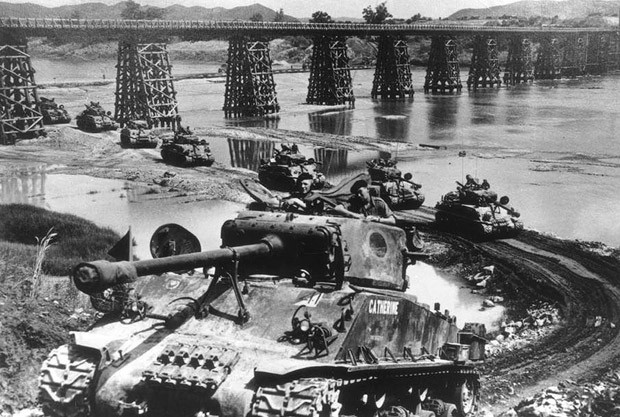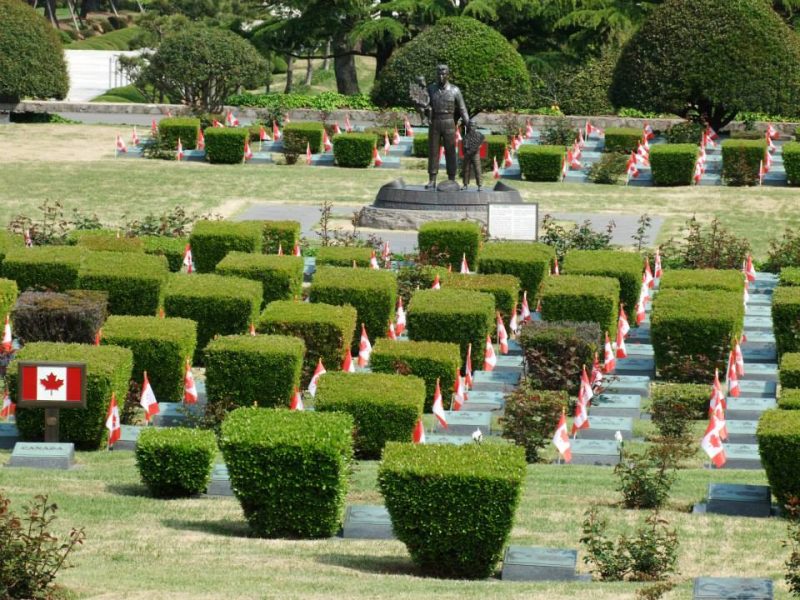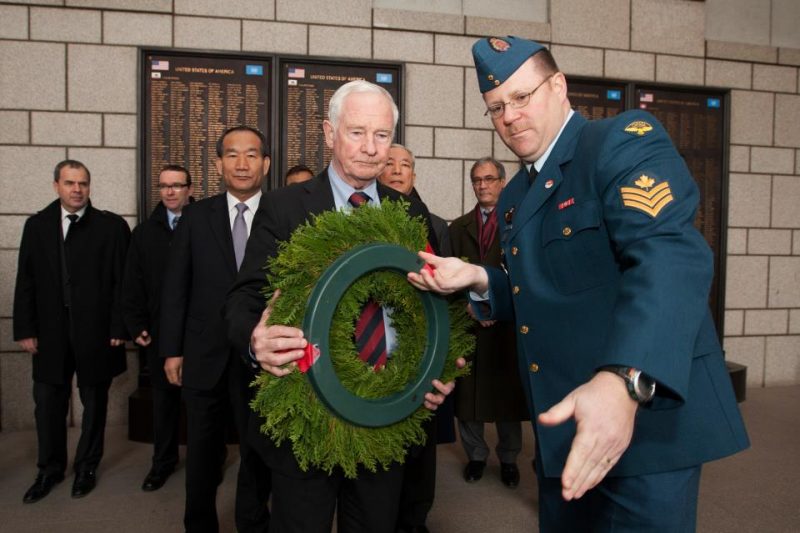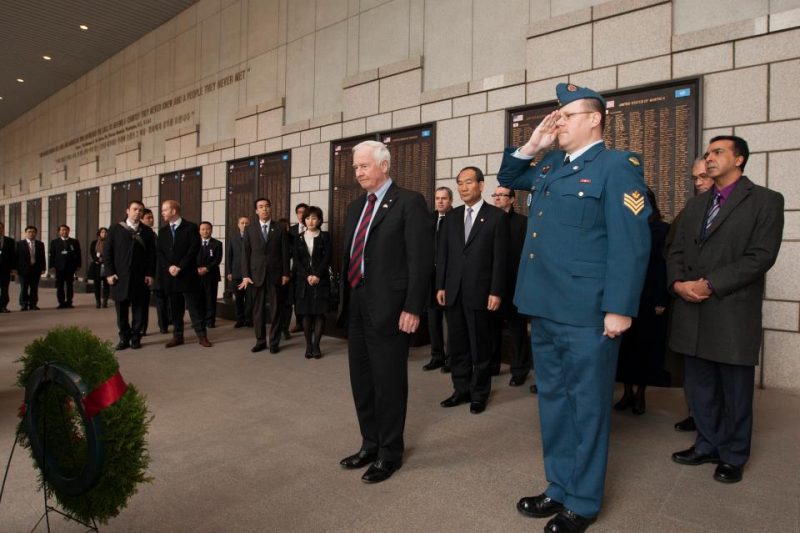Since Confederation, Canada has had a long, rich and proud military history that comprises armed actions and interventions that include wars, conflicts and peacekeeping initiatives and missions around the world. Canada indeed has a proud history of standing up to aggression, tyranny and oppression and doing what is right across the globe.
One of the most brutal military engagements in Canada’s history was the Korean War. Canada sent nearly Korean War27,000 troops to fight in Korea of which there are an estimated 8,000 Canadian Korean War veterans alive today. 516 Canadians died on the Korean peninsula of which 378 are buried at the United Nations Memorial Cemetery in Busan. The United Nations Cemetery is Busan is interestingly directed by a Canadian.
Korea has often been described as “The Forgotten War”, because for most Canadians (and Americans, British and Commonwealth allies) it was overshadowed by Canada’s great contributions in World War Two and quickly followed by the Vietnam War and the Cold War. Although Canada is a signatory to the original 1953 armistice that stopped the fighting on the Korean peninsula Canada did not keep a garrison in Korea after 1955. These factors along with others led one of the most brutal wars of the 20th century to be referred to as “The Forgotten War”.
However, the Korean War is ours to remember. There is no reason for those who fought in this key war of the 20th century to be forgotten and just as we remember with great pride the 1.1 million Canadians who served in the Second World War we can do the same with Korea. In fact, some Canadian World War Two veterans also served in Korea. Canada’s involvement in Korea is a source of Canadian pride.
Canada’s military relationship with Korea which dates back to the start of the Korean War on June 25, 1950 and it is an extremely important relationship that is not widely known because there is not a great military presence in Korea. However, Canada maintains very important military relations with Korea through the Canadian Defence Attaché and the Canadian Defence Attaché Assistant who both represent Canada and the Canadian Armed Forces in Korea.
Canadian Defence Attachés have resided in Seoul since 1979 and are based at the Embassy of Canada. Since 1990, defence relations between Korea and Canada have increased to include reciprocal military training, official visits and exchanges of information. This relationship is particularly enhanced by the Canadian Defence Attaché Admin Assistant who is a vital part of the Defence Attaché yet often works behind the scenes. (Foreign Affairs,Trade and Development).
Between July 2011 and June 2014 this position was held by Royal Canadian Air Force Sergeant Marc Bellemare who completed three years of service on the Korean Peninsula as the Canadian Defence Attaché Admin Assistant serving Canada behind the scenes in one of the world’s most heavily armed places.
Sergeant Marc Bellemare joined the Canadian Armed Forces in 1987 and has served for more than 27 years in across Canada in Ottawa, with the 409 Tactical Fighter Squadron in Cold Lake, Alberta and a short mission to Afghanistan. Sergeant Marc Bellemare served as the Assistant Liaison Officer for Canada to the United Nations Command from July 1, 2011 to June 30, 2014. It is no coincidence that Sgt Bellemare in Korea on Canada Day back in 2011. It is indeed a reflection of his loyal and dedicated service to Canada both at home and overseas.
Sergeant Marc Bellemare has superbly represented Canada with frequent participation as a member of the United Nations Command Military Armistice Commission in Korea. During his service he proudly wore a distinct yellow armband that was used to distinguish his service on the Demilitarized Zone (DMZ).
The United Nations Command Military Armistice Commission (UNCMAC), which is headquartered in Seoul and Panmunjom is responsible for supervising the 244 kilometre-long Demilitarized Zone (DMZ) under the authority of the Armistice Agreement signed between North and South Korea on 27 July 1953. The Demilitarized Zone (DMZ) serves as a buffer zone between North and South Korea and cuts the Korean Peninsula roughly in half, crossing the 38th parallel on an angle, with the west end of the DMZ lying south of the parallel and the east end lying north of it. It was created as part of the Korean Armistice Agreement between North Korea, China, and the United Nations Command forces in July 1953. (“Embassy of Canada, Seoul)
This Armistice Agreement remains the United Nation’s longest running Peacekeeping Mission. Canada contributes one Colonel (the Canadian Defence Attaché) and one Sergeant (the Canadian Defence Attaché Admin Assistant) who together form a Liaison Team to the UNC and participate in Guard Post inspections, investigations of cease-fire violations and other events and ceremonies including Repatriation of War Remains between the two Koreas.
For three years Sergeant Bellemare managed and controlled a challenging workload of program support services for The Canadian Defence Attaché which was much more than providing administrative support to the Colonel.
Indeed some of Sergeant Bellemare’s many duties were performing archival research; acting as liaison between the Canadian staff and other foreign attaché staffs; managing public funds; managing the representational responsibilities; maintaining efficient office filing systems and inventory of both domestic and foreign military policy and reference materials; planning, organizing and providing logistical and administrative support for meetings, seminars, and conferences.
However, it was Sergeant Bellemare’s duties and initiatives outside the office that deserve special mention. In his role as Canadian Defence Attaché Admin Assistant Sergeant Bellemare has led and participated in numerous inspections on the Korean Demilitarized Zone (DMZ) which is the world’s most heavily armed border and region in the world.
The United Nations Command Military Armistice Commission has maintained a presence at the DMZ by men like Sergeant Bellemare who in addition to routine inspections also conduct special investigations not only at the DMZ but the Northwest Islands as well.
Sergeant Bellemare was involved in the planning and logistics of Canadian veterans of the Korean War returning to visit Korea every year in April under programs sponsored by the Korean Veterans Association of Korea. Sergeant Bellemare through the Canadian Defence Relations Office, on behalf of Veteran’s Affairs Canada and the Department of National Defence Canada supported these visits and other commemorative activities.
One of these commemorative activities was the Imjin River Cup Classic which was started through Marc Bellemare’s initiative. Sergeant Bellemare originated the idea in September 2011 during the preparation for the 50th Anniversary of Diplomatic Relations between Canada and Korea which were held in 2013.
The Battle of the Imjin River was a strategic battle during late April in 1951 which was vital as the Chinese tried to recapture Seoul. As Canadian and allied forces maintaining positions along the Imjin River just miles from the front lines, hockey was played on a makeshift rink. Hockey offered a little piece of normal Canadian life to those who served in a war-torn Korea.
One of the most famous matches was the championship game between the 1st Battalion of Princess Patricia’s Canadian Light Infantry and the 2nd Battalion of the Royal 22e Régiment in March 1952 where Canadian troops in reserve built a rink on the frozen Imjin River behind the enemy lines. Sandbags constituted the boards with soldiers playing no hockey uniform, no pads, no shin guards, and no real equipment except skates and sticks and in battle dress. Eventually, makeshift hockey uniforms were acquired. The games were played under the sound of artillery fire in the middle of the Korean War with great Canadian pride.
This amazing game is continued in what has become a tradition in recent years thanks to the large efforts of Marc Bellemare and through the Canadian Embassy in Seoul together with the Seoul City Government, the Korea Ice Hockey Association, and the Korean Ministry of Patriots and Veterans Affairs is carried on each winter in Korea to this day. The Imjin River Cup was organized as a friendly hockey game in the memory of the Canadian soldiers who played on the front lines on the Imjin River 63 years ago during the Korean War.
Sergeant Bellemare’s experience and interaction with Canadian Korea War veterans during visits to Korea and his involvement with the start-up of the Korea Independent Hockey League (KIHL) as the Chief Referee and only foreigner referee in the league all provided him with the inspiration to honour these Canadians with the Imjin Memorial Cup event.
During his time as the Canadian Defence Attaché Admin Assistant Marc Bellemare had the opportunity to meet the Prime Minister of Canada twice, in March 2012 and February 2014, The Governor General of Canada in February 2013, the Premier of British Columbia Christy Clark and several members of Federal and Provincial Parliaments, as well as Senator Yonah Martin, who all supported Marc Bellemare’s Imjin River Cup Memorial initiative.
While poppies are worn three weeks before Remembrance Day in Canada to commemorate the sacrifices of those who fought and died during the wars of the 20th century including the Korean War no such poppies are worn in Korea by Koreans. This makes the Imjin Cup Memorial an important lesson for Koreans of Canada’s involvement and sacrifice on the Korean peninsula.
It is only because of men like Sergeant Marc Bellemare who while serving behind the scenes with our Commonwealth allies from Australia, New Zealand and the United Kingdom dedicated their mission to seeing that those who paid the ultimate sacrifice a world away are never forgotten. For his service in Korea Marc was awarded the US Army Commendation Medal, the Korea Service Medal from the Minister of National Defence of Korea, and a Commonwealth Certificate presented by the Canadian Ambassador to Korea.
Sergeant Bellemare’s service in Korea has set the bar high and with continued dedication from others in the position of Canadian Defence Attaché Admin Assistant the Korean War will indeed be the ‘Unforgotten War’.
‘LEST WE FORGET’
Marc is currently posted with 17 Wing Winnipeg as the Wing Comptroller Financial Services Supervisor.
(Ron Simpson grew up in Essex County near Windsor. He is a graduate of the University of Ottawa and the University of Western Ontario. Today he lives in Korea where he works as an Educational Consultant. His only living grandparent is Canada’s last living Distinguished Service Medal holder.)



